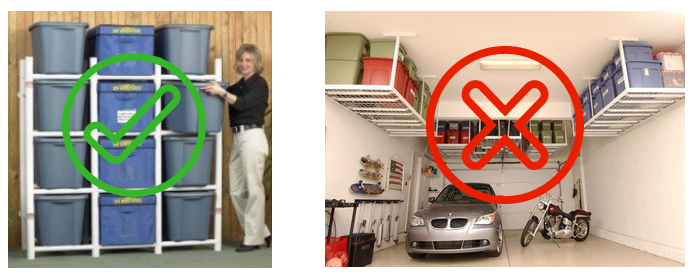When you own an online business, one of the questions that come up very quickly is, “Where will I store my products?”
Anyone selling physical products knows that proper storage can be the difference between a successful and unsuccessful store.
Think about it: If you don’t have sufficient space to store products at home, you could easily get frustrated when you’re trying to ship orders. Or if you’re working with an unreliable third party, you could disappoint your customers when their orders get lost.
The optimal product storage solution is different for each retailer, but in this post, we’ll look at some storage possibilities that will help you determine which is best for your unique operation.
Store Your Products at Home
For some retailers, storing products at home is the best way to keep track of them. With your products
However, it’s important to first determine if your
Make sure your products are stored in an appropriate environment
If your products are perishable, be sure you have the right amount of
You should also make sure your storage space isn’t prone to leaks, dampness, or smells that run the risk of damaging your products.
Make sure you have sufficient storage space that’s clean, dry, and

Storage bins
Have sufficient space to organize your inventory
If you’re storing products at home, keep products organized by size, color, or product type, etc. to make the
This will also help you see when certain products are getting low and will need to be

A way to keep your small products in order
Make sure your storage space is easily accessible
If it’s a headache every time you have to pull products out of home storage, you’re very quickly going to get tired of packing orders and maintaining your store.
Often times, this means high storage shelves or

With these three factors in mind, you can better decide if home storage is a wise choice for your business. If you feel that
Read also: Ecwid
Renting Space to Store Your Products
The costs associated with your storage space will vary based on the size of the unit, the location of the storage facility, and other special features you’ll need — such as climate control and an indoor vs. outdoor unit.

Storage units
In the U.S., the average national storage unit costs are:
$40-$50 per month for a5-by-5-foot unit$75-$140 per month for a10-by-15-foot unit$115-$150 per month for aclimate-controlled 10-by-15-foot unit$95-$155 per month for a10-by-20-foot unit$170-$180 per month for aclimate-controlled 10-by-20-foot unit- $225 per month for a
20-by-20-foot unit
Some quick math on this
If you were renting a 5×5 ft unit for 6 months at $45 per month, your annual storage fees would be about $270. If you needed a
In many instances, you can store products
If you’re not going to be selling a portion of your merchandise for several consecutive months, you could also consider renting a mobile storage unit. This is a storage unit that is dropped off for you to fill, and then is relocated to the company’s secure storage facility.

A storage pod
Typically, these storage pods range in size from 10ft x 10ft to 10ft x 30ft and are guaranteed up to $100,000. Costs for drop off and delivery range from
The math: If you stored
This option is not cheap, but it’s another convenient option for safely storing your products
Read also: How to Move Your Brick and Mortar Store Online: A
Drop Shipping
If you don’t want to keep your products in stock at home or in a rented space, another option to consider is dropshipping.
Drop shipping allows the retailer to ship product orders directly from the third party supplier to the customer (without ever having to handle the product.) Typically, this third party supplier is the wholesaler or manufacturer that produces the product.
However, there is a unique set of pros and cons to consider with this model.
Pros:
- Lower startup and overhead costs, as you’re not investing in a large amount of inventory
- No
over-stocking–you only ship what’s been paid for - No fees associated with rented space for storing products
- Packing, shipping, and returns is taken care of for you
- No
re-stocking or tracking inventory
Cons
- Inventory management depends on reliability of
third-party supplier - Complex shipping schedules and cost calculations
- Supplier mistakes are out of your hands — less overall control over inventory
- Low margins
- Poor customer service from supplier
- Unable to monitor product quality or develop personalized packaging
Depending on the needs and limitations of your unique business, drop shipping may (or may not) make sense for your business. Just remember to consider the pros and cons and decide based on your product needs.
- How to Sell Online: The Ultimate Guide for Business Owners
- How to Sell Online Without a Website
- 30 Ways to Make Your First Sale Online
- 7 Mistakes That Prevent You From Making Your First Sale
- How to Work With Focus Groups to Test Your Niche
- How to Write Product Descriptions That Sell
- Should You Copy, Rewrite, or Create Product Descriptions from Scratch?
- Tips to Make Your Products More Attractive
- Top Reasons for Returns and How to Minimize Them
- 8 Tactics and Common Mistakes of Selling Expensive Products
- How to Pay Yourself When You Own a Business
- Finding the Optimal Way to Store Your Products
- 8 Different Shopper Types And How To Market To Them









